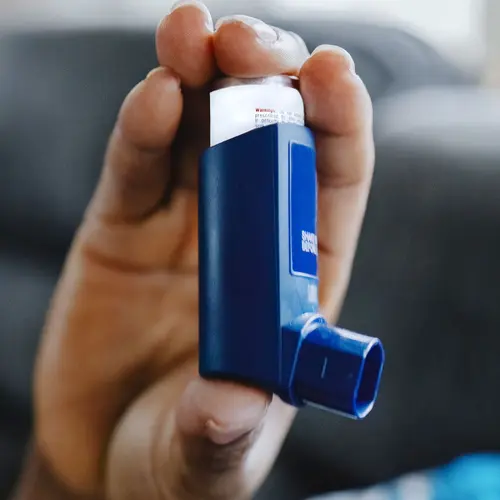Allergies are all about your immune system. The job of your immune system is to protect you from germs such as bacteria and viruses. But if you have an allergy, your immune system will also defend your body against a harmless substance such as cat dander or dust mites.
When you come across an allergy trigger, your body makes molecules called IgE antibodies. These trigger a series of reactions that can cause swelling, runny nose, and sneezing.
In people with allergic asthma, the muscles around their airways begin to tighten. The airways themselves also become inflamed and flooded with mucus.
Symptoms of Allergic Asthma
The symptoms of allergic asthma are generally the same as those of non-allergic asthma. They include:
- Coughing
- Wheezing
- Shortness of breath
- Fast breathing
- Tightening of the chest
What Are Some Common Allergens?
Allergens you inhale are some of the most likely to worsen your allergic asthma.
- Pollen from trees and grass, such as ragweed
- Mold
- Animal dander (from hair, skin, or feathers) and saliva
- Dust mites
- Cockroaches
People may also have allergic reactions if they touch or eat allergens. This type of exposure rarely causes asthma symptoms, but it can cause a serious and even life-threatening reaction, such as anaphylactic shock, which makes it hard to breathe.
Irritants can also trigger an asthma attack, even though they don't cause an allergic reaction.
- Tobacco smoke
- Air pollution
- Cold air
- Strong chemical odors
- Perfumes or other scented products
- Intense emotions that cause you to laugh or cry
Your doctor might recommend allergy tests to figure out what allergens affect you. These tests usually involve pricking your skin with a tiny amount of the suspected allergen or injecting it under your skin. Your doctor then checks your skin for a reaction.
If a skin test isn't possible, you might get a blood test instead.
Avoid Your Allergic Asthma Triggers
When pollen counts are high, stay inside as much as possible. Keep the windows closed. If you have an air conditioner, use it to filter the air.
To keep dust mites out, wrap your pillows, mattress, and box springs in allergen-proof covers. Wash your sheets once a week in hot water.
Get rid of items where dust can gather, such as on heavy curtains or piles of clothing. If your child has allergic asthma, only buy washable stuffed animals. Remove wall-to-wall carpeting, if possible.
If moisture is a problem in your home, get a dehumidifier to cut down on mold. Repair any plumbing leaks.
If you have pets, keep them out of the bedroom.
Keep your kitchen and bathroom very clean to avoid mold and cockroaches.
Be careful doing outside work. Gardening and raking can stir up pollen and mold.
Medications for Allergic Asthma
Bronchodilators, which relax the muscles around the airways, allow you to breathe easier. These drugs are often used to stop asthma symptoms after they've started. Sometimes, you use them daily to help control your asthma.
Anti-inflammatory drugs, which ease swelling, are used for long-term control of asthma.
Other medications can prevent your airways from tightening or block the release of chemicals that trigger the allergic reaction.
Allergy shots or tablets can train your immune system to stop overreacting to specific allergens.

